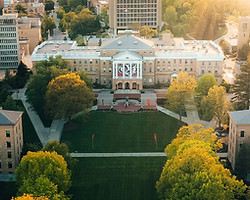
The early years
I grew up a block from where this picture was taken, in Stevens Point, Wisconsin, a small river-city in central Wisconsin. It was a great place to grow up. I spent much of my time playing sports of all kinds (but especially soccer and hockey) and hunting, fishing, and camping with my dad.
Education

B.S.
University of Wisconsin, Madison

M.S. & Ph.D
University of Georgia

Post-doctoral Fellowship
Naval Health Research Center
I began my formal training as a scientist at the University of Wisconsin-Madison. By my sophomore year I worked as a research assistant in Dr. Paul Sondel's lab in the Comprehensive Cancer Center. I primarily supported the work of Alexander L. Rakhmilevich, MD, PhD, who was focused on gene-based vaccinations for melanoma. I am forever indebted to the scientists in the Sondel lab for fueling my curiosity and developing me as a young scientist.
The main focus of the lab was on cancer treatment, and I always wanted to know how to prevent cancer. This way of thinking, combined with my love of triathlon, eventually led me to pursue graduate training in exercise neuroscience to study the relationship between the brain, stress, and the immune system.
After a year and a half off after undergrad, I headed south to the University of Georgia to study with Dr. Rod Dishman in the Exercise Science Department. Dr. Dishman had done some work in animals on the effects of exercise on the immune system so I was excited to continue my studies of the immune system. Unfortunately, we could not secure funding to continue this line of research, so my attention shifted toward how exercise might prevent psychopathology.
I studied the effects of chronic aerobic exercise on brain function and behavior for my master's thesis in Dr. Phil Holmes' lab and then began a collaboration with Dr. Brett Clementz's Cognitive Psychology lab during my doctorate. I was fortunate to win a Neuroimaging Fellowship in the Bioimaging Research Center at UGA to support my studies of how exercise alters emotion processing in the brain.
In 2009, with my wife pregnant, we moved to sunny Southern California so I could start a post-doc in the Warfighter Performance Department at the Naval Health Research Center. Over the next 4 years I would have the honor of serving those who serve our country by studying ways to enhance resilience.
Recognition
Here is a sample of some of the awards I've won doing what I love to do:
study ways to enhance brain health.

In the News
During my doctoral training, I investigated the effects of exercise on the brain. For my dissertation I evaluated the effects of an acute bout of moderate intensity aerobic exercise on feelings of anger. The initial results suggest that exercise prevented the onset of an angry mood, demonstrating that exercise is indeed medicine! This work was featured in the New York Times and WebMD.
During my post-doc, we executed the Marine Corps first randomized controlled trial of a mental skills training program designed to enhance resilience.
This work was featured in multiple news outlets including USA Today and Time Magazine.

Neuroimaging Fellowship
From 2006-2008, I was selected as a Paul D. Coverdell Neuroimaging Program Fellow at the Bioimaging Research Center (BIRC) housed at the University of Georgia's Biomedical and Health Sciences Institute. During my time at BIRC, I was part of a large group that used EEG, MEG, and fMRI to study the brain.

SAIC: Best Overall Publication
In 2012, while working at the Naval Health Research Center's (NHRC) Warfighter Performance Department in San Diego, I was fortunate enough to collaborate with the Optibrain Group, a consortium of scientists from UCSD, Naval Special Warfare, the Olympic Training Center, and NHRC. As part of this work, I helped analyze and publish several manuscripts related to how elite adventure racers process interoceptive information. One of those manuscripts was published in Social, Cognitive, and Affective Neuroscience (impact factor = 7), and was awarded SAIC's "Best publication" award. The highlight of the evening was receiving the award from retired 4-star General and former Air Force Chief of Staff, John Jumper.